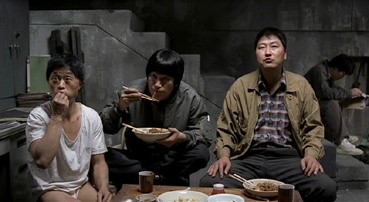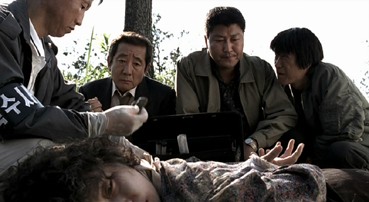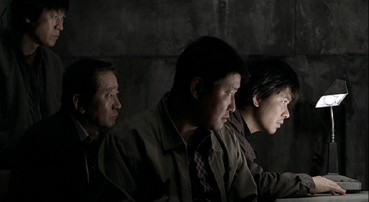|
If
I've learned one thing from recent Korean cinema it's
this: if you are visiting the country – and I have an
open invitation to do so in the near future from a Korean
friend of mine – then don't get arrested for anything. If
by some misfortune you do and are approached by two
detectives, one slim, one a little more portly, then
whatever you do don't let them get you in a room alone
with them. If movies are to be believed, by the time you re-emerge, you'll have
admitted to anything they have choosen to accuse you of.
Large
detectives with slim partners who abuse those in their
charge are becoming a regular feature of modern Korean
police dramas – even the seemingly civilised pair
who visit the floating monastery in Kim Ki-duk's Spring,
Summer, Autumn, Winter... and Spring seem to
have this size/weight distribution thing going. A similar
pair are at the centre of Bong Joon-ho's Memories
of Murder, and although this is one of several familiar
elements to be found in the film, it avoids both the
heavy borrowings from western cinema found in Public
Enemy and the overboard post-modernist visual
trickery of Nowhere to Hide, putting a fresh spin on every one of them and integrating them seamlessly into a compelling and vividly realised
whole.

The
majority of police dramas seem to be set in the
bustle of the city, where violent crime is more commonplace, where investigations can be frustrated by bureaucracy and non-co-operation,
where criminals can be lost on subways and down alleyways,
and where cars can chase each other through traffic and red
lights at pulse-raising speed. Based as it is on the
true case of Korea's first recorded serial killings, Memories of Murder takes place instead
in a rural district in the Gyeonggi province back in
1986, when the country was still under military dictatorship.
It
all kicks off when the body of a young girl, tied-up
and abused, is found in a farmland drainage ditch. Local
detective Park Du-man (Song Kang-ho) arrives to investigate, and is
frustrated to find the crime scene compromised and out
of his control, a situation that also plagues the discovery
of a second body a short while later. Into this world
walks introspective, thoughtful, Seoul-based city detective
Seo Tae-yun (Kim Sang-kyung), who has taken an interest in the case and
whose more studious working methods are initially scorned
by Park and his partner Cho Yong-ku (Kim Roe-ha), but which soon turn
up some useful and unexpected leads.
One
of the many elements given a makeover here is the old
story of a boy from the city bringing his working methods
to country folk and meeting local resistance, which
right from the start doesn't play as expected.
Rather than trying to take charge, Seo requests a desk
in the corner of the station house and silently observes
his two new colleagues going about their business in
their uniquely clumsy way. Park and Jo have their own
particular version of the Good Cop/Bad Cop routine,
in which Park coerces information from a suspect through
a mixture of subtle intimidation, misdirection and faked
evidence, and Jo simply kicks the living shit out of
them. His assaults leave no tell-tale scuff marks on
the suspect because before administering a beating he covers his
shoe with a garment of patterned design that looks as if
it was made for him by his mother. As a method of extracting
confessions it is largely effective, but as a way of
getting to the truth it is hopeless, as a week spent
in the boiler room with these two would prompt you to
admit to just about anything to get them to leave you
alone. That Seo quietly despairs at this approach does
not surprise – what does is that he does not try to correct Park's
behaviour, but instead all but ignores him and his partner and carries out
his own enquiries behind their backs. This split methodology is especially evident
in the early stages, where the film focuses primarily
on Park and Jo, whose own dead-end investigations are
suddenly usurped when Seo pipes up and presents crucial
evidence to the Chief that leads directly to the discovery
of another body.

It's somewhat inevitable that Park and Seo will eventually
learn to work together, but the journey to that moment is
rich in sometimes glorious character detail and full
of unexpected narrative side-steps, though the storytelling
never loses focus for a second, with even the smallest
incidents in some way driving the plot forward. Character
convention tells us that Jo will have to step aside
in order for Park and Seo to work more closely with
each other, but that Jo is eventually suspended for
doing exactly what he has always done is a little ironic,
while the moment when Park looks mournfully at the patterned
shoe-cover with which his partner used to pummel his victims
is without doubt the most perversely poignant
in the film. Both Park and Seo are transformed by the case as they feed off of each other's personality traits
– Park, it turns out, really does want to solve the mystery rather than just bang someone up for it, whereas
Seo's frustration at the perceived failing of his own
coda, "documents do not lie," eventually vents itself
in physical violence.
Serial
killer stories have their particular and peculiar
fascination, and Memories of Murder is
no exception, but it stands apart from so many of its sub-genre companions by focussing exclusively on the police investigation
and by telling its story with such tightly structured efficiency, with all of the
necessary twists and surprises delivered with the precision timing of a perfectly engineered Swiss watch. Director Bong Joon-ho builds
on this by suddenly shifting tone at unexpected moments,
a technique that ensures you are never quite sure where
the film will take you next. Thus, character-driven prolice procedural scenes can suddenly give way to moments of comic
hilarity (a brief sequence in which Park, convinced the
killer has no pubic hair, spends a day in a bath house
eyeing up the bathers' genitalia is a hoot) or palpable terror (a potential victim is terrorised by sounds in field at night and runs for
her life, only to have the killer leap up in front of
her). Nowhere is this better demonstrated than in a night-time stakeout of a murder scene, where tense apprehension suddenly switches to perverse comedy, then to a breathless on-foot chase in which all three
detectives pursue who thy think is the killer, but who turns out to be a frustrated family man who
was getting off by having a quiet wank at the crime
scene.
In some respects, the film has the key hallmarks of a work by Japanese
maestro Kitano Takeshi, in the compression of information
through economic editing, the deliberate pacing of scenes, the oddball character
detail, and an initially Joe Hisaishi-like score from
Japanese composer Irashiwo Tarah. As a whole, though,
despite being a very different film, it shares some
surprising common ground with Curtis Hanson's L.A.
Confidential, in its sudden and unexpected
shifts in tone, in the timing of its narrative surprises,
in the
events that initially divide but ultimately
unite the two seemingly irreconcilable lead characters, and particularly in the sheer quality of
its storytelling and the assurance of its filmmaking. Where the two
really part company is in the later stages, with Bong
staying true to the case on which the film is based,
something there would likely be studio pressure to change in
a Hollywood take on the story.
The
performances of the entire cast, from the leads to the bit parts,
are bang on. Song Kang-ho, who was so good in Park
Chan-wook's Sympathy
for Mr. Vengeance [Boksuneon
naui geot], really shines as Park, his
comic timing and sheer physicality (his first encounter
with Seo, whom he mistakes for a potential rapist, sees
him land a two-legged drop kick
square in the centre of the man's chest) really working
for a character who is engagingly likeable, occasionally
very funny, but sometimes frustrating in his loutish
refusal to accept the opinions or work of others. This
is particularly evident in his treatment of policewoman
Kwon Kwi-ok (Ko Seo-hie), whose key discovery regarding a radio broadcast he laughingly dismisses, then handing her
his teacup in a gesture that almost casts her as the
office domestic. Seo, on the other hand, not only takes
her seriously but makes good use of her talents,
asking her to conduct a key interview with a distressed female witness he knows will likely only open up
to another woman. You can't help but feel that
if Kwon returned to Seoul with Seo, she would very quickly
become a detective of some standing herself. As
the quiet and reclusive Seo, Kim Sang-kyung does not
really get to show his worth until the later stages,
where his emotions finally boil to the surface and he
has to confront the failings of the very system in which
he has invested so much faith. In the final scenes,
his anger and pain register all too clearly, but he
never lets this slip into melodrama – it's a largely
unshowy but very nicely judged turn that perfectly counterbalances
Song's more brashly comical Park.

To
integrate comedy into a thriller based on such a notorious
real case and make it work without ever diminishing
the seriousness of the crimes is no small task, but
to do so with the deftness Bong displays here is little short of miraculous.
This is partly achieved by ensuring that even when there
is an absurdist element to the narrative – Park and
Jo taking a break from beating up on a suspect to enjoy
a meal and a favourite TV show with him, for instance
– it never feels preposterous, just a little eccentric,
and it always works for the character and story. A great
example of this occurs early on, when a superbly organised and executed steadicam
shot follows Park's arrival at the second crime
scene, as members of the forensic team fall arse-over-tit down a grassy bank and a farmer ignores Park's shouts
and drives his tractor clean through a vital footprint, a sequence that is not staged purely for laughs but to economically outline the inexperience and incompetence of the local police force when it comes to handling
a crime of this nature. That Bong interweaves the drama with scenes
that reflect a time of political repression and change
for the country is interesting in itself, but once again he makes this
crucial to the story, notably when efforts to catch the killer
are frustrated because the required manpower has been diverted
to suppress a demonstration elsewhere.
Memories
of Murder is filled to the brim with such detail,
but it is far more than just a collection of great scenes
and engaging characters. It succeeds most of all because,
like the aforementioned L.A. Confidential,
the parts are all melded into a tremendously well rounded, involving
and entertaining whole. Wonderfully performed and beautifully
photographed by Kim Hyeong-gyu, Memories of Murder is directed with a
confidence and style that must mark relative newcomer Bong as a filmmaker with a serious
future ahead of him.
Framed
at 1.85:1 and anamorphically enhanced, the transfer here
is gorgeous, a pin-sharp picture that reproduces the film's
subtle use of sepia tinting very nicely indeed. Colour,
within the restrictions imposed by the film itself, is bang
on, black levels are excellent, and contrast, though a tad
strong, is generally fine. No obvious signs of edge enhancement
were present – and I was looking for them after seeing how
sharp the picture was – and artefacting is kept to an absolute
minimum.
With
the upcoming region 2 release promising only a Dolby 2.0
soundtrack, the 5.1 and DTS tracks here give this disc the
technical high ground, and both really work for the film.
The separation is excellent right across the soundstage,
with very effective use of the rear speakers – music often
washes over the whole room, though surprisingly little use
is made of the lower frequencies. Of the two tracks, the
DTS is noticeably richer, and has more definition.
In
terms of extras, this Hong Kong release lags behind both
the Korean 2-disc set from CJ Entertainment and the upcoming
region 2 release from Optimum, though it should be noted that the extra features on the
Korean release lack English subtitles.
First
up with have the Theatrical Trailer,
with is presented 1.85:1 non-anamorphic and, unusually
for a trailer, has both Chinese and English subtitles.
Behind
the Scenes is 11 minutes of DV footage watching the actors at work
on various scenes, and is made up almost exclusively of
out-takes. The entire cast seem ready to burst out laughing
at the slightest provocation and the atmosphere on set
comes across as very relaxed, the relationships between
the cast and crew cheerfully positive. This is great fun
to watch, even without the aid of subtitles (you don't
really need them), and made me wish for more of the same.
There
are 3 brief TV Spots, none of
which have subtitles, but at 11 seconds each they don't
really need them.
Photo
Gallery has 13 production stills, all about half screen size.
Filmographies has, well, brief filmographies of the two lead actors
and the director, in both Chinese and English.
Memories
of Murder was one of the best films released
in the UK in 2004, a gripping, intelligent and occasionally
hilarious character-driven crime drama, far more low key
than most recent Korean police thrillers and most Hollywood
takes on the serial killer sub-genre. It also rewards
repeated viewing and is definitely a film that anyone
with even a passing interest in this subgenre should
own. I, for one, can't wait to see what director Bong
Joon-ho does next.
UK
viewers may want to hang on for the upcoming region 2
release from Optimum, which has some interesting-looking
extras, but if the reports of a Dolby 2.0 soundtrack are
true then I'd be tempted to go either for this disk (which
can be picked up on-line for about £8) or the Korean
2-disk edition and rent the Optimum disk to check out
the extras – after all, how many times are you going to
want to view them, whereas the film is one I have already
come back to three times, and the picture and sound here
are terrific. It has to be said that the comedy elements
worked best in the cinema with a large audience, but the
sheer skill of the storytelling, the richness of the characterisations
and the skilled technical handling make it seem fresh
every time I see it. If you've seen it already then it's
just a matter of which disk to go for – if you haven't,
then I'd move to to the top of your Must-See list immediately.
You won't regret it.
|